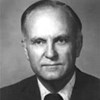Dr. Sennholz heads the Department of Economics at Grove City College in Pennsylvania and is a noted writer and lecturer for freedom.
War is the brutal and inhuman method of settling differences between governments. But no matter how great these differences may be, the old arbitrator, time, finds an end to it all. Even the Vietnam war will one day come to its end.
War cannot be driven out by war, for the use of evil breeds more evil, hostility more hostility, and the use of force more force. Peace is the natural state of man, war the temporary repeal of reason and virtue.
In the words of James Madison, fourth President of the United States, "Of all the enemies to public liberty war is, perhaps, the most to be dreaded, because it comprises and develops the germ of every other. War is the parent of armies; from these proceed debts and taxes; and armies, and debts, and taxes are the known instruments for bringing the many under the domination of the few. In war, too, the discretionary power of the Executive is extended; its influence in dealing out offices, honors, and emoluments is multiplied; and all the means of seducing the minds, are added to those of subduing the force, of the people…. No nation could preserve its freedom in the midst of continual warfare."
If this is the true nature of war we can deduce the problems and tasks of its liquidation. We need no government committees that plan for peace, no politicians or commissioners who draft new laws or regulations, merely peace.
Armies can be disbanded without delay. Free labor markets can absorb any number of veterans discharged from military duty. For, contrary to popular opinion, there is no given number of jobs. The demand for labor depends entirely on the price of labor. And this price readily adjusts to any change in labor supply. There is no record of any serious unemployment when millions of American veterans were discharged after the Civil War or the two world wars.
It is true, in labor markets that have been rendered rigid through labor union power, surpluses actually may exist. Employment in unionized industries is no longer subject to adjustment through wage flexibility, but is regulated by seniority rule and union decision. This is why returning veterans cannot expect to find employment in these industries unless they meet union specifications.
Termination of war also should permit repeal of all wartime levies. Tax rates can be reduced to prewar levels unless the government incurred a debt in pursuit of the war. In past American wars, such as the Revolution and the Civil War, the debt was retired in about one generation. The World War I debt was retired rapidly until the Great Depression administrations increased it again. After World War II, no attempt was made at debt reduction. In fact, large budget deficits have added more than $120 billion to the previous debt.
Wartime taxes are not easily reduced after the war. Government does not voluntarily surrender revenue; its departments and bureaus have insatiable appetites, and powerful pressure groups clamor for government services and benefits. Paraphrasing James Madison, especially in the postwar period government influence in dealing out offices and benefits is multiplied with the lush revenues from wartime levies, "and all the means of seducing the minds are added to those of subduing the force of the people."
Could this be the objective of the government committees and planning boards created by several state governments? Peace needs no commissioners or directors, merely reduction and retrenchment of government. The American economy needs no help from government in its necessary readjustment from war to peacetime production. It is true, armament and ammunition industries will have to curtail their operations, and consumers’ goods industries will expand. In a market economy such as ours, labor and capital always respond to the purchasing power of consumers. And in case tax levies on business should be reduced, the end of war will lead to new capital formation, which in turn would increase economic output and raise standards of living. How can government planning committees aid business in production improvements?
We love peace, but not peace at any price. We do not fear the economic consequences of peace, but the government that is planning for peace.

